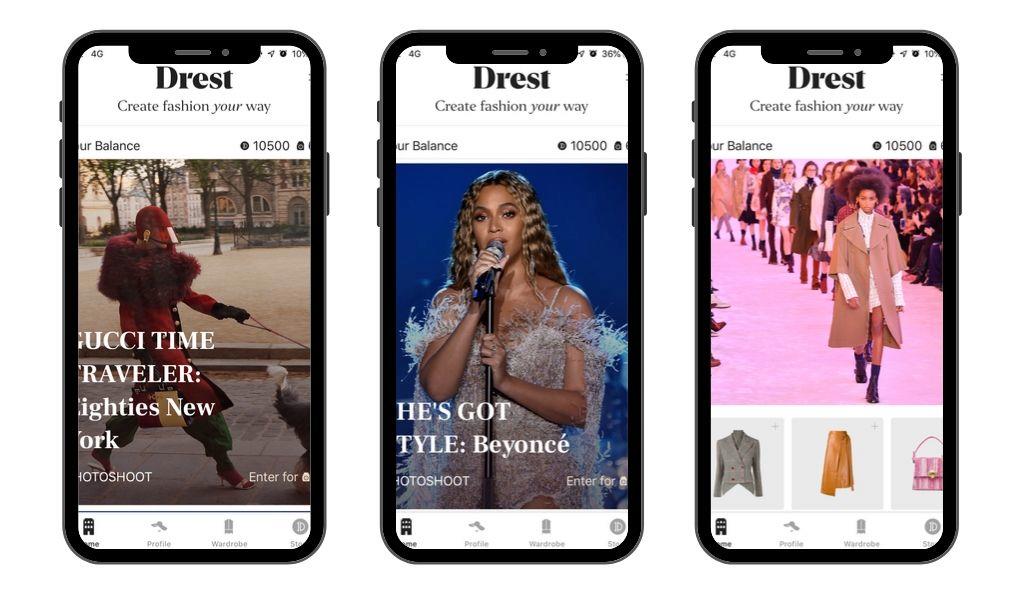Drest’s announcement of a $19 million funding round signals that mobile gaming is catching on among fashion and beauty brands.
Since its launch in 2019, mobile gaming app Drest has recorded 250% annual user growth and raised more than $30 million. Its 260 brand partners include Breitling, Cartier, Christian Louboutin, Fendi, Gucci, Prada and Valentino. It does not disclose user numbers, but its iOS app has been downloaded more than a million times.
U.K-based Drest announced the $19 million (£15 million) funding round in late June. The investment and subsequent development of Drest come at a time when fashion companies like Revolve are entering the mobile gaming market. In 2022, Raissa Gerona, chief brand officer at Revolve said that, in gaming and its partnership with gaming platform Muus, Revolve “saw a perfect opportunity to expand [its] reach to a new, highly engaged community while staying true” to its DNA. Revolve plans to release a game in 2024.
Drest plans to use the investment to develop features in the game, push further into digital beauty, and roll out more social functions and avatars. The new edition of the game, Drest 2.0, is set to debut in spring of 2024. Drest 2.0 is being created developed using the Unity platform. Unity’s owners recently said that the company will begin leveraging AI to facilitate easier game creation. Drest 2.0, which is currently being soft-launched in a small number of countries, will be available on Android and iOS, expanding the potential audience of Drest which was formerly iOS-only.
Although its focus so far has been on digital fashion, Drest is now expanding its focus to beauty and entertainment. “We have this real time narrative around fashion and styling that everything feeds from on the platform,” said Lucy Yeomans, founder of Drest. “That makes us the right marketing partner for the certain projects in the future in that entertainment space, like Netflix which has rolled out more fashion-[heavy] series like ‘Bridgerton’ in recent years.”
“Research has shown that Gen-Z customers are more likely to spend their money on fashion than on any other entertainment category,” said Moin Roberts-Islam, technology development manager at London-based Fashion Innovation Agency. “Since they are more likely to spend time on mobile devices than any other age group, there is a vast section of the customer base who are primed for experiencing fashion via mobile gaming.”
“Our research has shown that 75% of customers who have taken part in a brand’s immersive experience feel that they understand the brand better and feel closer to the designer, and they feel that taking part in the experience added positive value to the garments featured,” said Roberts-Islam. “Drest has all the potential ingredients to become a major player in bringing digital fashion to mainstream audiences.”
The company makes its revenue a number of ways, including through in-app purchases, brand partnerships, subscriptions and advertising. Players can purchase virtual currency, called Drest Credits, which can be used to buy new clothes, accessories and locations. Drest also offers a premium subscription service granting members access to exclusive features, such as unlimited challenges and the ability to create their own avatars. Meanwhile, brand partnerships generate revenue through advertising, sponsorships and affiliate marketing offered on digital items offered for purchase in-game. Drest partners with fashion brands to create exclusive challenges and content, plus it displays ads within the app. These ads can be targeted to specific users based on their interests.
Through newly launched partnership opportunities, Drest will soon feature avatars of famous fashion designers who will take users through fashion calendar-related challenges. “There will be narrative tours, where designers will give you tasks, like the task of styling their designer bag,” said Yeomans. “There will also be tasks related to events — so for a month, you could work through different tasks related to fashion month or red carpet [season]. They’ll [allow] the player to feel like they’re going on that journey.”
Yeomans also plans to offer brand influencer trips that will take place on the platform. These will include personalized storytelling and virtual gifting. “If you’re going on this ski trip with a brand, the first thing you do is get a little gift of ski gloves, as a “Welcome to Gstaad” present,” said Yeomans, noting an example. “Then you read some content about the challenge and the story, and you participate in that challenge while learning about the brand’s latest collection or initiative.” These trips, like the designer tours, will provide new sponsorship opportunities for brands.
In the trip or event scenario, a user could spend two hours on Drest, according to Yeomans. “These events are so important to brands right now,” said Yeomans. “They’re such big sales converters, but they’re just for their VIP customers, editors, buyers or influencers. This is a way to blow open the exclusive event, and allow everyone to go in a way that is personalized to each gamer and never feels crowded.”
In addition, the company plans to implement an affiliate model to drive revenue for beauty brands, which will partner with influencers to share and engage with the game on their social platforms. It’s more suitable for beauty brands, compared to fashion brands, as their price points are often more accessible.
In addition to fashion brands, beauty brands like Nars and makeup artists including Lisa Eldridge have invested in Drest. Depending on the company, their beauty looks, products or models can be used by Drest players when styling.
Mobile gaming revenues reached $92.2 billion in 2022, accounting for 50% of the $184.4 billion global gaming market. It is estimated that the global gaming market will be worth $214 billion by 2025, according to consulting company SkyQuest. What’s more, 50-55% of mobile gamers are now women, and gamers’ average age is 36.
In mobile gaming, women’s session times are about 25% more than men. And at Drest, our engagement times are off the charts on our current iOS game,” said Yeomans. “People spend 12-15 minutes on a session, and they come back three times a day.”
“Discovery and developing affinity have always been problems for brands and retailers,” said Yeomans. “We allow then do that virtually and experiment with the platform.”




